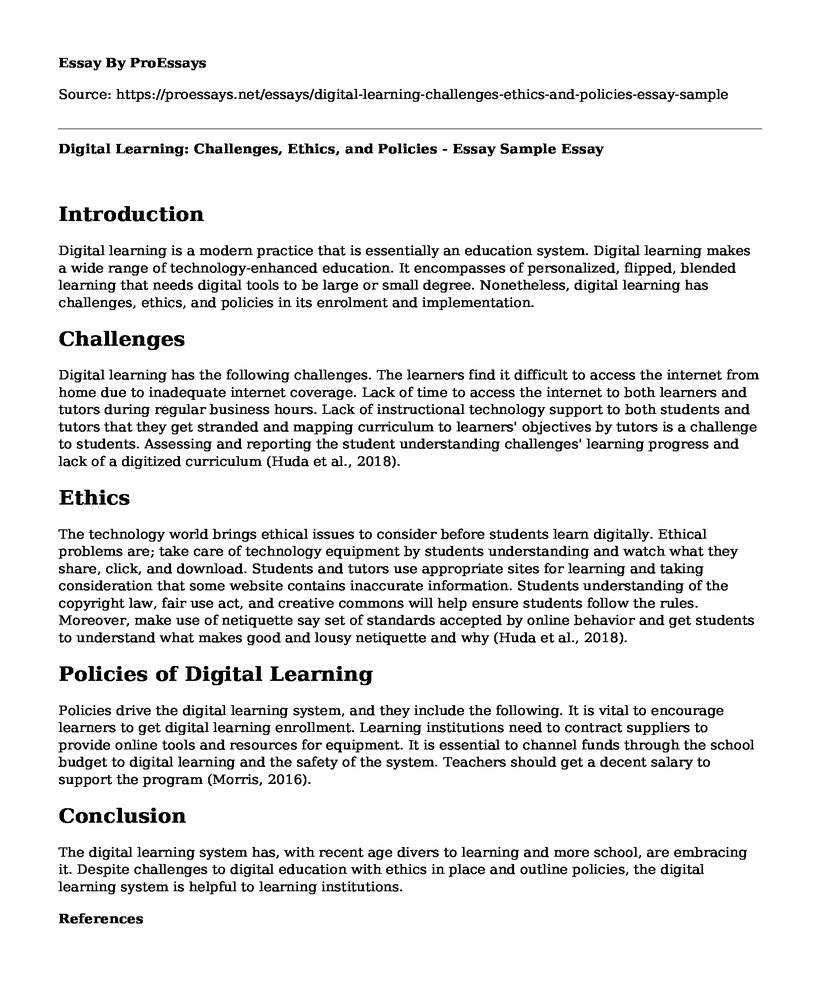Introduction
Digital learning is a modern practice that is essentially an education system. Digital learning makes a wide range of technology-enhanced education. It encompasses of personalized, flipped, blended learning that needs digital tools to be large or small degree. Nonetheless, digital learning has challenges, ethics, and policies in its enrolment and implementation.
Challenges
Digital learning has the following challenges. The learners find it difficult to access the internet from home due to inadequate internet coverage. Lack of time to access the internet to both learners and tutors during regular business hours. Lack of instructional technology support to both students and tutors that they get stranded and mapping curriculum to learners' objectives by tutors is a challenge to students. Assessing and reporting the student understanding challenges' learning progress and lack of a digitized curriculum (Huda et al., 2018).
Ethics
The technology world brings ethical issues to consider before students learn digitally. Ethical problems are; take care of technology equipment by students understanding and watch what they share, click, and download. Students and tutors use appropriate sites for learning and taking consideration that some website contains inaccurate information. Students understanding of the copyright law, fair use act, and creative commons will help ensure students follow the rules. Moreover, make use of netiquette say set of standards accepted by online behavior and get students to understand what makes good and lousy netiquette and why (Huda et al., 2018).
Policies of Digital Learning
Policies drive the digital learning system, and they include the following. It is vital to encourage learners to get digital learning enrollment. Learning institutions need to contract suppliers to provide online tools and resources for equipment. It is essential to channel funds through the school budget to digital learning and the safety of the system. Teachers should get a decent salary to support the program (Morris, 2016).
Conclusion
The digital learning system has, with recent age divers to learning and more school, are embracing it. Despite challenges to digital education with ethics in place and outline policies, the digital learning system is helpful to learning institutions.
References
Huda, M., Maseleno, A., Atmotiyoso, P., Siregar, M., Ahmad, R., Jasmi, K. A., & Muhamad, N. H. (2018). Big Data Emerging Technology: Insights into Innovative Environment for Online Learning Resources. International Journal of Emerging Technologies in Learning (iJET), 13(01), 23.
Morris, I. (2016). E-Ethics and Higher Education: Do Higher Education Challenges Make a Case for a Framework for Digital Research Ethics? Networking Knowledge: Journal of the MeCCSA Postgraduate Network, 9(5).
Cite this page
Digital Learning: Challenges, Ethics, and Policies - Essay Sample. (2023, May 22). Retrieved from https://proessays.net/essays/digital-learning-challenges-ethics-and-policies-essay-sample
If you are the original author of this essay and no longer wish to have it published on the ProEssays website, please click below to request its removal:
- Essay Sample on Writing Portfolio
- Prepositional System of Arabic and English Paper Example
- Critical Thinking as the General Education Outcome
- Barriers to Student Play: Impact on Performance and Stress - Essay Sample
- Essay Example on Preschool: A Foundation for Development & Interaction
- Essay Exampe on Bullying Among Children: Power and Social Status Dynamics
- Essay Sample on Electronic Addiction







